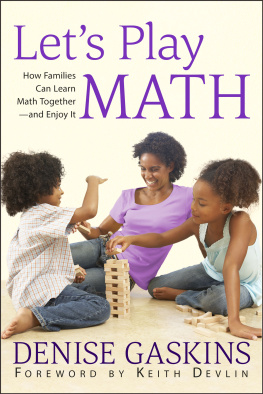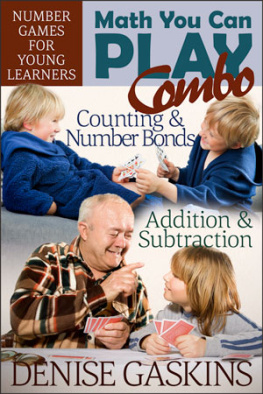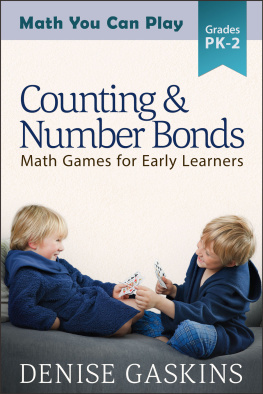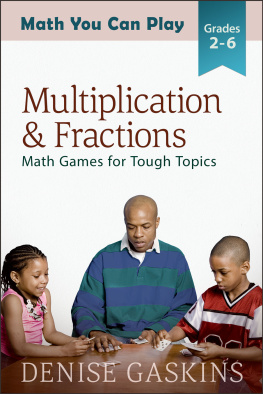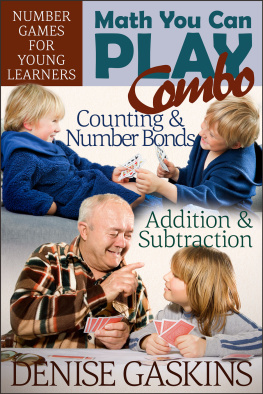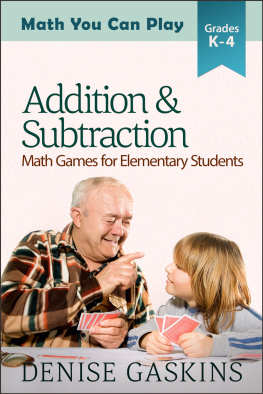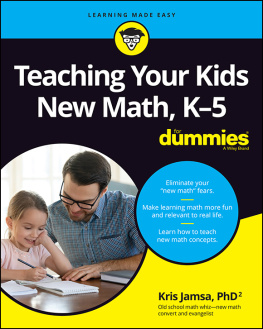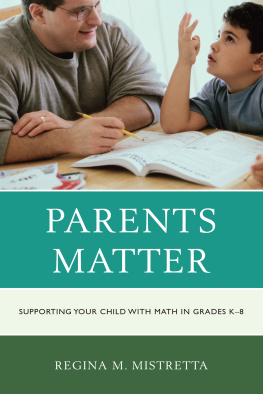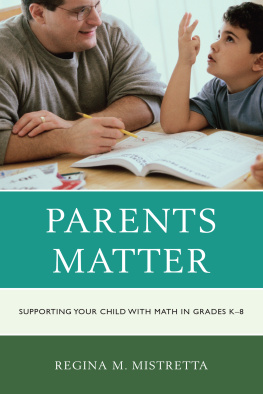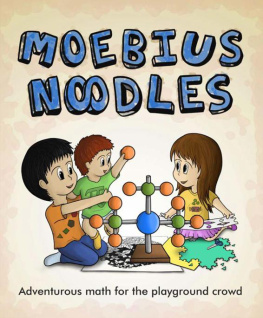Lets Play Math
How Families Can Learn Math Togetherand Enjoy It
Denise Gaskins
Foreword by Keith Devlin
Copyright 2012, 2014, 2016 Denise Gaskins
Foreword Copyright 2016 Keith Devlin
All rights reserved.
Ebook version 3.31
Tabletop Academy Press
tabletopacademy.net
Readers Love Lets Play Math
This book will change the way you look at math forever. Lets Play Math challenges parents to teach their kids to think like mathematicians and use their problem solving skills to really understand concepts rather than just memorize processes. Definitely a must-read e-book for all homeschoolers!
Lilac Mohr, author of Math & Magic in Wonderland
In a culture where maths anxiety is now a diagnosable problem, this book shows the way to maths joy.
J. Mcandrews, online reader review
I loved how this book reframes our concepts of Math to recover an intuitive, living sense of numbers and the real world. Along the way, readers will learn games and kinds of behavior they can adopt to develop a Math sense in their children.
Rafael Falcon, online reader review
With this approach I can teach my kids to think like mathematicians without worrying about leaving gaps. I cant wait to take my children by the hand and head off to explore the wonderful world of maths.
Lucinda Leo, NavigatingByJoy.com
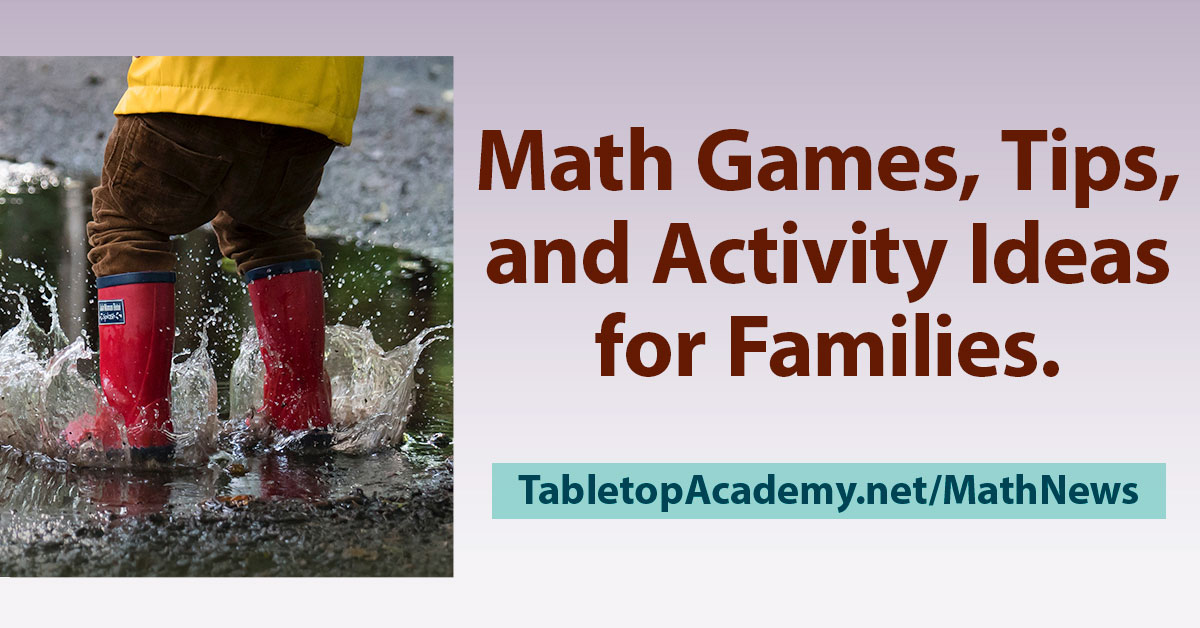
Free Playful Math Newsletter
Want to help your kids learn math? Join my free newsletter for monthly (well, most months) activity ideas. And youll be among the first to hear about new books, revisions, and sales or other promotions.
tabletopacademy.net/mathnews
Contents
The best way to learn mathematics is to follow the road which the human race originally followed: Do things, make things, notice things, arrange things, and only then reason about things.
Above all, do not try to hurry. Mathematics, as you can see, does not advance rapidly.
The important thing is to be sure that you know what you are talking about: to have a clear picture in your mind. Keep turning things over in your mind until you have a vivid realization of each idea. When we find ourselves unable to reason (as one often does when presented with, say, a problem in algebra) it is because our imagination is not touched. One can begin to reason only when a clear picture has been formed in the imagination.
Bad teaching is teaching which presents an endless procession of meaningless signs, words, and rules, and fails to arouse the imagination.
W. W. Sawyer
Foreword
Authors and publishers of new mathematics and math education books frequently ask me to write a foreword or a cover endorsement. Denise Gaskinss Lets Play Math: How Families Can Learn Math Together and Enjoy It is not one of those cases. I volunteered to write a foreword. I did so because I wanted to help in any way I could to get this book into the hands of as many parents and math educators as possible, particularly the hands of the large number of homeschooling parents in the USAmany of whom purchase some of my books or listen regularly to my Math Guy segments on NPR, and some of whom email me and attend public talks I give around the country.
For, in the publishing world, the odds are stacked against Ms. Gaskins. She is not a professor at a major university, nor indeed any institute of higher education. Nor is she an award winning career teacher. On top of which, she does not have a major publisher behind her. I could have put a yet in that last sentence, but Im not at all sure her future success with this book will play out that way, though in terms of sheer quality it could if she wanted.
So who is she? you may ask. On the Amazon page for the first edition of this book, which she self-published under the banner Tabletop Academy Press, she describes herself this way:
Denise Gaskins is a veteran homeschooling mother of five who has taught or tutored at every level from preschool to undergraduate physics. She loves math, and she delights in sharing that love with young people.
Here is how she summarized her mathematics education activities when I asked her for a bit more detail:
1978-1984: assorted jobs including volunteer tutoring, physics T.A., and a one-semester stint as a 6th-grade teacher in a private school
1982 (I think): B.S. in physics & science writing, Purdue University
1984-present: homeschooling mother of five
1992: began writing sporadically about math education
1995-2014: led math circles or math classes for local homeschoolers
1998: published my first booklets to accompany math workshops for homeschool groups
1998-2001: published bimonthly Mathematical Adventures newsletter for homeschoolers
2006: started Lets Play Math blog, originally aimed at homeschooling parents but the audience has widened over the years
2009: started Math Teachers at Play blog carnival to support creative math education in families and classrooms
2012: published Lets Play Math ebook first edition
2015: contributing author to Sue VanHattums Playing with Math: Stories from Math Circles, Homeschoolers, and Passionate Teachers
2015: published two Math You Can Play books of number games (Counting & Number Bonds and Addition & Subtraction) in ebook and paperback
I deliberately left in the caveat in her 1982 entry as I find it particularly revealing. The physics major and the science writing, at one of the nations top engineering universities, explain a lot about her success; the year is irrelevant, implying (at least to me) that she is not particularly interested in the university credential. Credentials play an important role in society, but they definitely get in the way of good education.
Denise and I have never met, but having followed her blog Lets Play Math for over eight years, I feel I know her. I first encountered her back in 2008, when I wrote a series of articles in my online Devlins Angle column for the Mathematical Association of America, asking teachers to stop teaching multiplication as repeated addition.
Why did I suggest that? Because it isnt. See my MAA posts for June, July-August, and September of 2008 for explanations of why it isnt and why it is harmful to teach it as such, and then January 2011 for a brief summary of what multiplication is.
maa.org/external_archive/devlin/devlin_06_08.html
maa.org/external_archive/devlin/devlin_0708_08.html
maa.org/external_archive/devlin/devlin_09_08.html
maa.org/external_archive/devlin/devlin_01_11.html
Those articles were not opinion pieces; I was simply reporting what has long been known about mathematics and math education. Yet many people reading them assumed they were, and argued vehemently, and often passionately, that I was wrong. But arguing based on your existing beliefs is the worst thing to do in education. Learning is about looking at the evidence, reflecting on it, cross-checking to ensure veracity of reporting, and then adjusting your knowledge and beliefs accordingly. If you are not discovering that you were wrong, or that you did not properly understand something, then you are not learning. Period.
Enter Denise into the fray. (It was actually more like a firestorm at the time.) Her July 1, 2008 post on Lets Play Math, which she wrote right after she read the first of my multiplication-is-not-repeated-addition posts, was one of the best illustrations of how the mathematics learning process should progress I have ever seen. Check it out, paying particular attention to her
Next page
